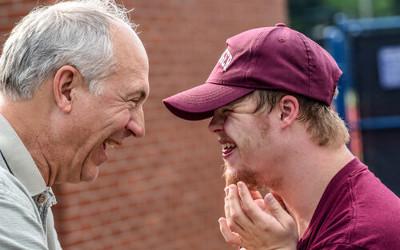Alzheimer’s Society wins grant for research on early dementia detection in Down syndrome population

Alzheimer’s Society, in partnership with a team led by Dr Samara Banno from The Open University, has been awarded an Open Societal Challenges (OSC) funding grant for their innovative project titled "Detecting the Early Signs of Dementia in the Down Syndrome Population Using Intelligent Modelling." This project aims to address the urgent need for early detection methods in high-risk groups, such as individuals with Down syndrome, who face a significantly increased risk of developing dementia.
The research initiative focuses on analysing genetic and biomarker data to identify early indicators of dementia, specifically in those with Down syndrome. People with Down syndrome are more likely to develop dementia than the general population due to the trisomy of chromosome 21, with a mean age of diagnosis around 55. However, the age of onset varies widely, with some individuals showing symptoms as early as age 40, while others remain unaffected until their 60s. By understanding the interplay of genetic and biological markers, the research team hopes to pinpoint patterns that may facilitate earlier and more accurate diagnoses.
A key aspect of the study involves examining the influence of sex differences on dementia development in this group. Research indicates that women with Down syndrome, particularly after early-onset menopause, are more prone to cognitive decline, possibly due to lower oestrogen levels. By focusing on this group, the project also aims to assess the potential of hormone-replacement therapies to mitigate cognitive deterioration, thereby opening new avenues for clinical trials and therapeutic interventions.
The project stands to benefit from the Alzheimer Biomarkers Consortium-Down Syndrome (ABC-DS) dataset. This longitudinal dataset, funded by the National Institute on Aging, offers rich data on adults with Down syndrome over time, allowing researchers to track and analyse potential dementia biomarkers. The targeted features in this dataset will be analysed by advanced intelligent modelling including Artificial Intelligence and machine learning techniques The innovative modelling approach will enable the team to identify subtle patterns in vast data sets, which conventional methods might overlook. This, in turn, could lead to more precise early detection and intervention strategies.
Winning the OSC grant empowers Alzheimer’s Society to drive forward with this transformative research. According to Julia Galloway, a representative of the charity, “The work has the potential to change lives by identifying those most at risk, allowing for timely, targeted interventions that could improve quality of life and possibly delay the onset of symptoms.” She emphasized that Alzheimer’s Society has been at the forefront of dementia research for over 30 years and is committed to initiatives that deliver real-world impact.
The project will deliver several critical outputs, including applications for additional funding, scientific publications, stakeholder engagement events, and knowledge-sharing workshops. These efforts will foster collaboration among researchers, policymakers, and healthcare providers, ensuring that the findings have a lasting impact on healthcare practices and policies. The team has also outlined a pathway for translating research into potential diagnostic tools, which could have both societal and economic benefits by improving patient care and potentially leading to new therapeutic technologies.
Alzheimer’s Society is also investing in the development of the next generation of researchers through this project. With a multi-disciplinary team that includes experts in life sciences, computing, and psychological science from prestigious institutions, the project aims to advance knowledge across the academic and medical fields. Alzheimer’s Society hopes that this research will lay the groundwork for a deeper understanding of dementia in Down syndrome, supporting improved healthcare outcomes and providing a model for future research on neurodegenerative diseases.
With the support of the OSC funding, Alzheimer’s Society and Dr Banno’s team are poised to make substantial contributions to the fight against dementia, ultimately offering hope and tangible improvements for individuals with Down syndrome and their families.
About Open Societal Challenges
The OU’s Open Societal Challenges programme aims to tackle some of the most important societal challenges of our time through impact-driven research.
The programme’s focus on the themes of Tackling Inequalities, Living Well and Sustainability align well with the OU’s mission to be open to people, places, methods and ideas.
The programme’s aim is to apply excellent research by OU academics to some of the most pressing challenges facing people across the UK and worldwide to transform lives and drive societal change.
Contact our news team
For all out of hours enquiries, please telephone +44 (0)7901 515891
Contact detailsNews & articles

The FUNdamentals: Why fun matters more than we think
In a world that feels increasingly serious and pressured, fun can seem like a guilty pleasure — something optional, even frivolous. But what if fun isn’t an add on at all? What if it’s essential?